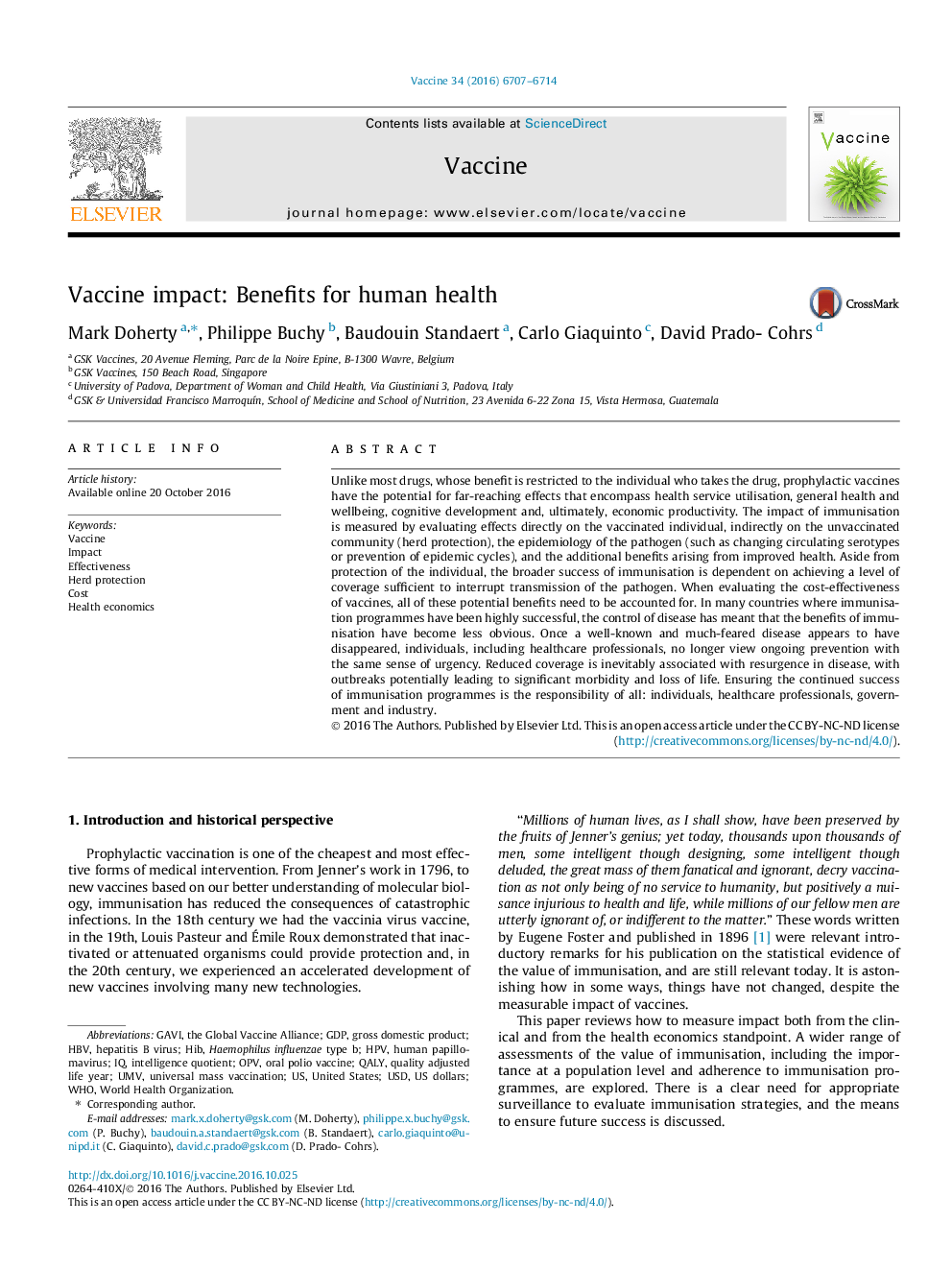| کد مقاله | کد نشریه | سال انتشار | مقاله انگلیسی | نسخه تمام متن |
|---|---|---|---|---|
| 5536787 | 1402305 | 2016 | 8 صفحه PDF | دانلود رایگان |
عنوان انگلیسی مقاله ISI
Vaccine impact: Benefits for human health
ترجمه فارسی عنوان
تاثیر واکسن: مزایای سلامت انسان
دانلود مقاله + سفارش ترجمه
دانلود مقاله ISI انگلیسی
رایگان برای ایرانیان
کلمات کلیدی
UMVUniversal mass vaccinationQALYOPVEffectiveness - اثربخشیHealth economics - اقتصاد سلامتUnited States - ایالات متحده آمریکاintelligence quotient - بهره هوشیGross domestic product - تولید ناخالص داخلیGDP - تولید ناخالص ملیherd protection - حفاظت از گلهUSD - دلار آمریکاUS dollars - دلار آمریکاWorld Health Organization - سازمان بهداشت جهانیImpact - ضربهHaemophilus influenzae type b - نوع hemophilus influenzae bCost - هزینهHBV - هپاتیت بHib - هیبVaccine - واکسنOral polio vaccine - واکسن فلج اطفالhepatitis B virus - ویروس هپاتیت بیHuman papillomavirus - ویروس پاپیلوم انسانیHPV - ویروس پایپلوم انسانیWHO - کهquality adjusted life year - کیفیت زندگی سال تنظیم شده استGAVI - گاوی
ترجمه چکیده
بر خلاف بسیاری از مواد مخدر که به نفع فردی که دارو مصرف می کند محدود است، واکسن های پیشگیرانه بالقوه برای اثرات گسترده ای که شامل استفاده از خدمات بهداشتی، بهداشت عمومی و سلامت، توسعه شناختی و در نهایت بهره وری اقتصادی است. تأثیر ایمن سازی با ارزیابی اثرات مستقیم بر روی فرد واکسینه شده، به طور غیرمستقیم در جامعه غیر مجاز (حفاظت از گله)، اپیدمیولوژی پاتوژن (مانند تغییر سروتایپ های سرطانی یا جلوگیری از چرخه های اپیدمی)، و همچنین مزایای اضافی ناشی از بهبود سلامتی. گذشته از حفاظت از فرد، موفقیت گسترده ای از ایمن سازی مستلزم دستیابی به سطح پوشش است که کافی باشد تا وقفه انتقال ویروس را ایجاد کند. در هنگام ارزیابی اثربخشی هزینه واکسن، همه این مزایای بالقوه باید مورد توجه قرار گیرد. در بسیاری از کشورها که برنامه های ایمن سازی بسیار موفق بوده اند، کنترل بیماری به این معنی است که مزایای واکسیناسیون کمتر آشکار شده است. به نظر می رسد که بیماری به خوبی شناخته شده و بسیار بیمار ناپدید شده است، افراد، از جمله متخصصین مراقبت های بهداشتی، دیگر پیش بینی های مداوم را با همان فوریت مشاهده نمی کنند. پوشش کاهش یافته ناگزیر با رونق بیماری همراه است، زیرا شیوع آن به طور بالقوه منجر به مرگ و میر ناشی از مرگ و میر ناشی از مرگ و میر می شود. اطمینان از ادامه موفقیت برنامه های ایمن سازی مسئولیت همه افراد، متخصصان مراقبت های بهداشتی، دولت و صنعت است.
موضوعات مرتبط
علوم زیستی و بیوفناوری
ایمنی شناسی و میکروب شناسی
ایمونولوژی
چکیده انگلیسی
Unlike most drugs, whose benefit is restricted to the individual who takes the drug, prophylactic vaccines have the potential for far-reaching effects that encompass health service utilisation, general health and wellbeing, cognitive development and, ultimately, economic productivity. The impact of immunisation is measured by evaluating effects directly on the vaccinated individual, indirectly on the unvaccinated community (herd protection), the epidemiology of the pathogen (such as changing circulating serotypes or prevention of epidemic cycles), and the additional benefits arising from improved health. Aside from protection of the individual, the broader success of immunisation is dependent on achieving a level of coverage sufficient to interrupt transmission of the pathogen. When evaluating the cost-effectiveness of vaccines, all of these potential benefits need to be accounted for. In many countries where immunisation programmes have been highly successful, the control of disease has meant that the benefits of immunisation have become less obvious. Once a well-known and much-feared disease appears to have disappeared, individuals, including healthcare professionals, no longer view ongoing prevention with the same sense of urgency. Reduced coverage is inevitably associated with resurgence in disease, with outbreaks potentially leading to significant morbidity and loss of life. Ensuring the continued success of immunisation programmes is the responsibility of all: individuals, healthcare professionals, government and industry.
ناشر
Database: Elsevier - ScienceDirect (ساینس دایرکت)
Journal: Vaccine - Volume 34, Issue 52, 20 December 2016, Pages 6707-6714
Journal: Vaccine - Volume 34, Issue 52, 20 December 2016, Pages 6707-6714
نویسندگان
Mark Doherty, Philippe Buchy, Baudouin Standaert, Carlo Giaquinto, David Prado- Cohrs,
